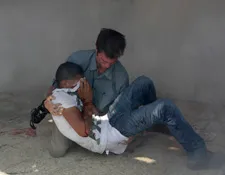CPJ Journalist Security Guide
Covering the News in a Dangerous and Changing World
Stress Among War Correspondents: One Key Study
Conducted in 2002, 140 war correspondents studied:
- 28.6%
- Lifetime prevalence of post-traumatic stress disorder
- 21.4%
- Rate of depression
- 14.3%
- Rate of substance abuse
Post-traumatic stress is a normal reaction to abnormal events. Stress can affect not only war correspondents, but journalists covering any tragedy involving pain or loss of life. Death penalty executions, random shootings, terrorist bombings, sexual assault, sexual abuse of children, domestic violence, suicides, and bullying are among the stories that can cause extreme stress. Post-traumatic stress can manifest itself in many ways. The individual experiencing stress may be able to articulate no more than simply having the feeling that something is just not right, or that something more should be done. For journalists whose job is to observe and report on events, not act on them, merely watching human tragedies unfold can extract an emotional toll. Journalists who interview trauma victims, in fact, may themselves be exposed to and experience what experts call vicarious or secondary trauma. Photo and video editors may be traumatized from handling one grisly image after another. News managers on every level may be traumatized from the stress of helping to manage the risks facing their reporters and photojournalists, especially in the wake of injury or fatal loss.
Signs of Stress

Taking Care of Yourself
Recognizing that you are traumatized may be the hardest step. Many journalists and soldiers have something in common in that the dominant culture of both groups has tended to resist recognizing the impact of trauma. “I’m still not sure that our culture is ready to accept this,” Gen. George W. Casey Jr., the U.S. Army’s chief of staff, told The New York Times in 2009. Explaining the need to cope with emotional stress can be a hard sell to a young private who mainly “wants to hang out with his buddies and drink beer,” he said. Learn to care for yourself. Take a break from work, tell an editor that you need a new beat. Give yourself the opportunity to grieve or experience your emotions.
Journalists need to learn how to take care of themselves. Simply taking a break can be invaluable. So can finding the courage to tell an editor that you need a new beat. Even more important may be allowing yourself to grieve or otherwise experience your own emotions. Regular exercise helps to relieve stress, according to scientific experts. The National Institutes of Health National Center for Complementary and Alternative Medicine reports that mind-body exercises such as yoga, tai chi, qi gong, and meditation can be beneficial.
Articulating your emotions is another way to relieve stress. Journalists can only benefit from discussing their experiences with each other. The venue could be a place in the newsroom or a nearby coffee shop. Newsroom managers should help create opportunities and forums for such peer debriefing to take place. “What I really needed was time with fellow journalists, to talk through all the things that happened,” said Penny Owen of The Oklahoman in an interview with the Dart Center after the 1995 bombing of an Oklahoma City federal building. “By the time we slowed down, everyone was so tired of the bombing that we never really got to have that big hashing-out session.” Whatever the venue, the setting should be one where no one feels judged and journalists feel safe to open up in front of each other.
Speaking to a counselor is another option for journalists experiencing emotional stress. The Dart Center provides a guide for choosing a therapist. Many therapists have experience in treating post-traumatic stress, and a recommendation from a friend is often a good place to start in finding a good counselor. (Some health insurance plans will help cover costs. See Chapter 1, section on Insurance Coverage, and Appendix C Insurance Providers.) Some cultures are more resistant than others to recognize post-traumatic stress. Journalists living in nations where there is little awareness of the issue may be well advised to consult the website of the Dart Center.